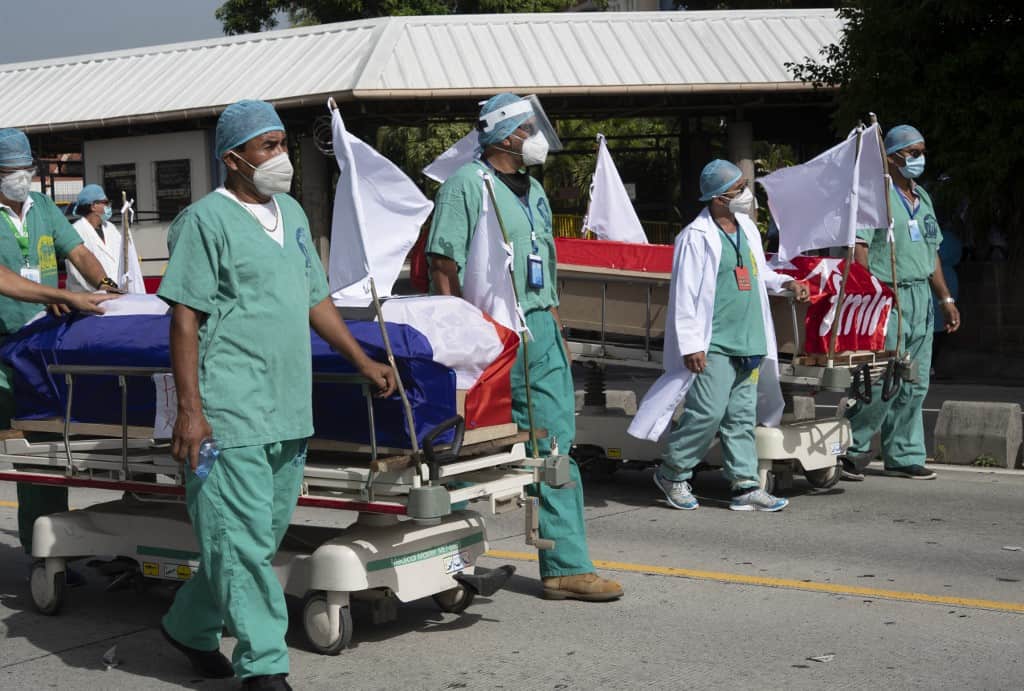Long confinements and widespread pessimism in Latin America due to the advance of the coronavirus and the economic debacle have fueled tensions, which in some cases are beginning to turn into protests.
The pandemic has caused 3.7 million infections and close to 160,000 deaths in Latin America so far, and without the imminent prospect of the curve flattening, patience is wearing thin for some sectors, who have mostly obeyed the guidelines of the authorities.
A call for a “cacerolazo” — banging pots and pans, or otherwise making noise as protest in Chile on Tuesday night degenerated into hotbeds of violence.
Protesters pressed for a law that would allow the early withdrawal of pension funds so that families can weather the sustained lack of income due to the economic crisis caused by the quarantine.
“The aid from [the government of Sebastián] Piñera has not arrived,” Agustín Serrano, an unemployed mechanical engineer, 41, told AFP. Serrano said he needed pension funds in order to pay off a debt to a private school.
In the center of Santiago, masked men set fire to at least 20 vehicles and a public transport bus. On the outskirts of the city, despite the current curfew and military deployment, protesters erected barricades and looted supermarkets.
The riots ended with 61 detained.
The law, which Piñera opposes, was approved the next day by deputies.
Frustration on the rise
Also on Tuesday, in Bolivia, some 4,000 people defied the mandatory quarantine and marched about 12 km from El Alto to La Paz.
“We are defending job stability, there are many layoffs,” said Juan Carlos Huarachi, the miner who heads the Bolivian Workers’ Central. He denounced that the government of the right-wing Jeanine Áñez has not respected “its own decrees” of labor immobility.
Although the march, which reached the vicinity of the government palace, ended peacefully, previous demonstrations had another outcome.
Days earlier, residents of a neighborhood on the outskirts of Cochabamba, who demanded the closure of a nearby landfill because they considered it a source of infection, were severely repressed by the security forces who deployed helicopters and military aircraft.
In response, the Inter-American Commission on Human Rights (IACHR) reminded the Áñez government “of its obligations to guarantee human rights, not to criminalize leaders, leaders and participants in social protests.”
Carlos Malamud, a researcher on Latin American issues at the Elcano Royal Institute, finds it unlikely “for the moment” that protests will be widespread, although the management of the pandemic may lead to an increase in tension based on “the vision that citizens have of the work of their rulers and their degree of coherence.”
But the deterioration of the economic situation, Malamud adds, can be decisive, especially in countries where protests and discontent were already on the agenda before the pandemic forced a pause.
“The worrying thing will arise when this has passed or begins to be left behind. Then it will be the time for the most massive recriminations, depending on the results: human and economic losses and the way to manage the crisis,” the expert predicted.
Individual liberties
Brazil, Mexico, Peru and Chile are the most affected countries in the region by COVID-19, which will cause an additional 45 million people to fall into poverty in Latin America and the Caribbean, according to the UN.
After almost five months since the virus erupted, governments juggle to manage their economies — which ECLAC estimates will lose more than 2.7 million companies and at least 8.5 million jobs.
The increasing virulence of the epidemic has reversed plans for reopening, as occurred in cities and neighborhoods in Chile, Colombia, Venezuela, Ecuador, Peru, El Salvador and Brazil, among other countries.
In Argentina, where the quarantine has been especially strict and long — now around 120 days — last week there were protests in various cities in defense of “individual liberties.”
“Health matters, but the economy also. One does not go without the other. The State is not there to leave us paralyzed,” claimed José Carlos Vélez, 49, who was in downtown Buenos Aires with people waving Argentine flags and honking their car horns.
Quarantine, yes! Quarantine, no!
Social pressure turns in opposite directions.
In Brazil, supporters and opponents of the far-right Jair Bolsonaro government demonstrated in Brasilia — both for and against the president.
Bolsonaro, who has been confined to his official residence since last week after contracting the virus, reiterated his position on Thursday against dictating measures that affect the economy, arguing that “lack of wages and work kill more than virus.”
Thursday, 1,000 Salvadoran health workers marched, urging Congress to toughen the quarantine to contain the spike in infections.
El Salvador had been under strict restrictions for almost three months, and despite the increase in cases, progressive opening of activities began on June 16.
“We no longer want more deaths, more infected by the pandemic. We demand quarantine, otherwise the health system will collapse, and the people will pay,” Ricardo Monge, one of the protest leaders, told AFP.
In Panama, the hardest-hit country in Central America and whose hospitals are on the verge of collapse, protests by health workers have multiplied to demand protective equipment, supplies and more staff.
On Thursday, groups of doctors stationed themselves in front of the main public medical center.
“The staff is getting sick and they have to stay home,” David Macías, a doctor who himself had contracted COVID-19, told AFP. The increasing patients and decreasing staff “really worsens” care for patients with COVID- 19.






